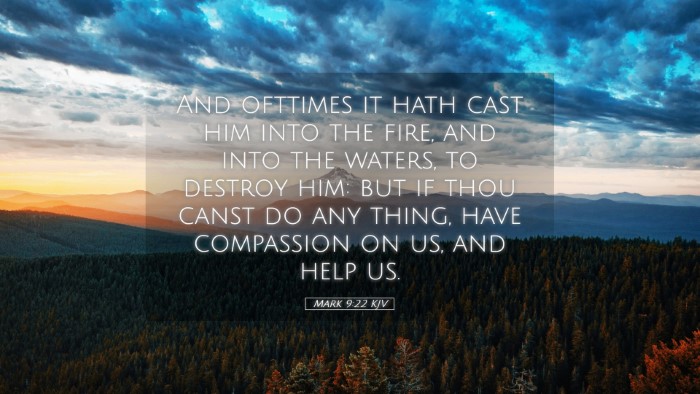Commentary on Mark 9:22
Mark 9:22 states: "And ofttimes it hath cast him into the fire, and into the waters, to destroy him: but if thou canst do any thing, have compassion on us, and help us." This verse, spoken by a desperate father seeking healing for his afflicted son, opens a window to the deep issues of faith, desperation, and divine compassion. Below is a summary of insights drawn from public domain commentaries by Matthew Henry, Albert Barnes, and Adam Clarke.
Contextual Analysis
This passage occurs in the narrative of the transfiguration, which leads into the story of healing that is faced with the challenges of belief and despair. The father’s plea epitomizes the struggles of many believers facing dire situations. It reflects not only physical suffering but the emotional and spiritual turmoil that accompanies such trials.
Insights from Commentaries
Matthew Henry’s Commentary
Matthew Henry emphasizes the father's plea as one filled with both desperation and faith. He interprets the phrase "if thou canst do anything" as indicative of the father's wavering belief, reflecting the human tendency to doubt even in earnest supplication. Henry points out that this duality is common – the tension between despair and hope is a part of the human condition, particularly in hardship.
-
Desperation Cultivates Faith: Henry suggests that the father’s desperation led him to Jesus, highlighting the reality that our most profound needs often drive us toward spiritual answers.
-
The Nature of Compassion: He elaborates on the importance of compassion, indicating that the father seeks not just healing but also empathy from Christ. This illustrates a core characteristic of Christ's ministry – His willingness to engage with human suffering.
Albert Barnes’ Notes
Albert Barnes offers a vibrant theological reflection on the nature of belief and the efficacy of prayer. He underscores the importance of both the petition and the inherent struggle with faith present in the father’s words. Barnes emphasizes:
-
Faith in the Midst of Weakness: Barnes explains that the father's mixed feelings demonstrate the universal struggle with faith, urging readers not to neglect coming to Christ even amidst feelings of inadequacy.
-
The Role of Intercessory Prayer: He also points out the significance of interceding for others, as the father did for his son. This highlights the communal aspect of faith, where one can carry the burdens and hopes of others in prayer.
Adam Clarke’s Commentary
Adam Clarke delves deeper into the nuances of the text, focusing on the psychological turmoil experienced by the father. He analyzes the behavior of the demon afflicting the boy, noting the destructive nature of evil which seeks to harm. According to Clarke:
-
The Reality of Demonic Influence: Clarke takes a historical approach, noting how such maladies were often attributed to demonic forces. This perspective emphasizes the genuine struggle against evil and the need for spiritual warfare.
-
The Essential Nature of Compassion: He reflects on the compassion of Christ, arguing that it is not merely an emotion but a powerful force that acts to deliver and restore. Thus, the plea of the father resonates with the divine nature of Jesus being willing to engage compassionately with human suffering.
Theological Implications
The implications of Mark 9:22 are profound for pastors, students, theologians, and Bible scholars. This verse is an invitation to explore the following theological themes:
-
The Interplay of Faith and Doubt: This verse illustrates the tension that exists in the Christian walk—the coexistence of faith and doubt. Recognition of this reality can lead to a more profound understanding of grace and assurance for those who struggle with believe.
-
Christ’s Compassion as a Model: The compassionate response of Jesus toward those in need is a model for pastoral care and counseling. It encourages believers to engage with those who are suffering with empathy and action.
-
The Need for Community Support: The father's intercession highlights the importance of community in the face of personal crises, reminding believers that they are part of a larger body tasked with bearing one another’s burdens.
-
The Nature of Healing: Understanding this narrative encourages a holistic approach to healing—recognizing that it encompasses physical, emotional, and spiritual dimensions, urging future ministers to be well-rounded in their care approaches.
Conclusion
Mark 9:22 serves as a rich narrative filled with layers of meaning regarding faith, suffering, and compassion. The insights from the commentaries of Henry, Barnes, and Clarke offer valuable lessons for those involved in ministry, academia, or personal study of Scripture. It is a profound reminder that in our moments of greatest desperation, we are invited to bring our struggles before Christ, who stands ready to respond with love and power.


